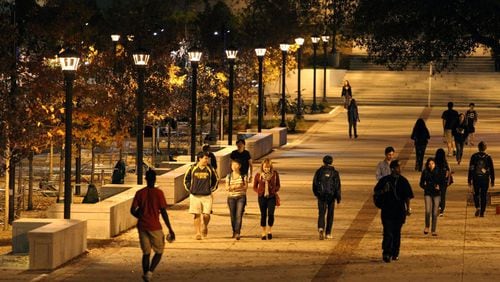HOW WE GOT THE STORY
Using data compiled by the universities, The Atlanta Journal-Constitution reported late last year about the rising number of sex assaults on college campuses in Georgia. With new data for 2013 due Oct. 1, The AJC gave the issue a fresh look and found that at many schools reports of rape and sexual assault have continued to increase. The AJC has reviewed more than 200 campus police reports involving sexual assault on the larger college campuses in the state, and will continue to report on this issue for readers.
The 18-year-old freshman was discovered by fellow students, passed out in a men’s shower stall at a University of Georgia dormitory wearing only an oversized T-shirt that wasn’t hers. Curled up in the fetal position, a dark bruise ran the length of her neck.
The last thing she remembers: a tall, white male buying her vodka drinks at a downtown Athens bar the night before. Crying and confused, she told campus police she may have been drugged. And raped. But the end of the night is a blank. She doesn’t know.
The September 2013 case — detailed in a campus police file reviewed by The Atlanta Journal-Constitution — is one of dozens of sexual assaults Georgia college campuses reported this week to federal education officials. The new statistics show reports of sexual assaults have jumped at most of Georgia’s larger universities, including UGA, Georgia Tech, Kennesaw State and Georgia Southern. School officials attribute the rise to better outreach, leading to more students coming forward.
Long relegated to the shadows, campus sex assault is drawing national scrutiny. The White House has launched a campaign, pressing universities to do more to keep students safe. A grim report from U.S. Sen. Claire McCaskill, D-Mo., found many universities are failing to investigate allegations of sexual assault. New federal regulations take effect this fall mandating stricter reporting requirements of sex crimes on campus.
Just days ago, California became the first state in the nation to enact a “yes means yes” law requiring state colleges to adopt a policy of explicit, affirmative consent by students engaged in sexual activity.
In Georgia, the university system in August convened a committee and pledged a review due out later this year of how colleges handle sexual assault complaints.
The new data released this week covers 2013 and shows Emory University still has the highest number of reported sexual assaults among the Georgia campuses reviewed by the AJC, although their tally declined slightly to 22 — down from 25 the year prior.
“Emory University’s efforts to build a safe and supportive environment on our campus are helping students who have been affected by sexual violence to come forward and get the help and support they need,” the school said in a statement.
Also in Atlanta, Morehouse College saw sexual assault reports soar to 10 in 2013, up from none the year before.
In 2013, three members of the Morehouse basketball team allegedly drugged and raped an 18-year-old Spelman College freshman in a campus dorm room in March of last year. Reports suggested the victim may have been under the influence of the party drug, "Molly."
Morehouse officials said stricter federal reporting requirements along with heightened attention “increased the number of cases being reported by victims.”
At Georgia Tech, sex assault figures doubled, from nine to 18. The school recently rewrote its sexual misconduct policy and in statement said it “takes each of these incidents seriously.”
At Kennesaw State University, reports more than doubled, from three in 2012 to eight last year. Georgia Southern saw its numbers triple, from two in 2012 to six last year.
The University of Georgia tallied 17 reports in 2013, a jump from 14 the year before.
Like Emory, UGA chalked up the increase to stronger education efforts,
“Our students apparently are feeling more comfortable and confident reporting. We have no evidence that the increase in reporting signals an increase in occurrences,” said a statement from UGA.
Even as the numbers rise, it is still believed that rape and sexual assaults are vastly underreported. Studies suggest that as many as one in four women are the victims of sexual assault on college campuses. At UGA — with roughly 13,000 female undergraduate students — that would translate into 3,250 women.
By law, colleges must inform the federal education of all reported sexual assaults in order to continue to receive federal aid. An Atlanta Journal-Constitution review of more than 200 campus police reports at Georgia colleges found many sexual assault victims report what happened to health officials or student counselors but choose not to involve police.
The September 2013 case at UGA was one example where police investigated the alleged assault.
Records reviewed by the AJC show UGA campus police aggressively investigated the young woman’s case, tracking her movements to a dorm room, and identifying the male student she was with. The male student told police they had consensual sex. Police obtained search warrants and scoured the student’s room for date rape drugs, sending every stray pill they found off for testing.
The campus police investigative report stretched several hundred pages. But ultimately the case concluded, as most do, without any criminal prosecution. Toxicology tests concluded the woman had only alcohol in her system, police said.
The campus safety reports are provided to the U.S. Department of Education, which compiles the data. National figures won’t be available until later this year, federal officials said.







